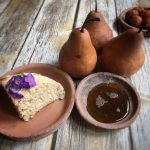Cumin
The Romans cooked their food in multi-nuanced layers of herbs and spices, including savory, rue, lovage, coriander, myrtle, and bayberries. Cumin was their go-to spice of choice, and it is no coincidence that the Island of Comino derives its name from the seed which was once cultivated on its shores. According to the Greek philosopher Theophratus ‘cursing and shouting’ when sowing cumin encouraged the seed, whilst in his encyclopedia, ‘Natural History (Naturalis Historia) , Pliny the Elder mentions that inhaling the scent of cumin during sexual intercourse hastens conception.
Cumin which imparts an earthy, warming, and aromatic character to food, was, conversely, rumoured in the ancient world to infuse the complexion with a funereal pallor. Julius Vindex, a contemporary of Emperor Nero, consumed the spice in enormous quantities to give false hope to sycophants ‘waiting like vultures for their inheritance.’





